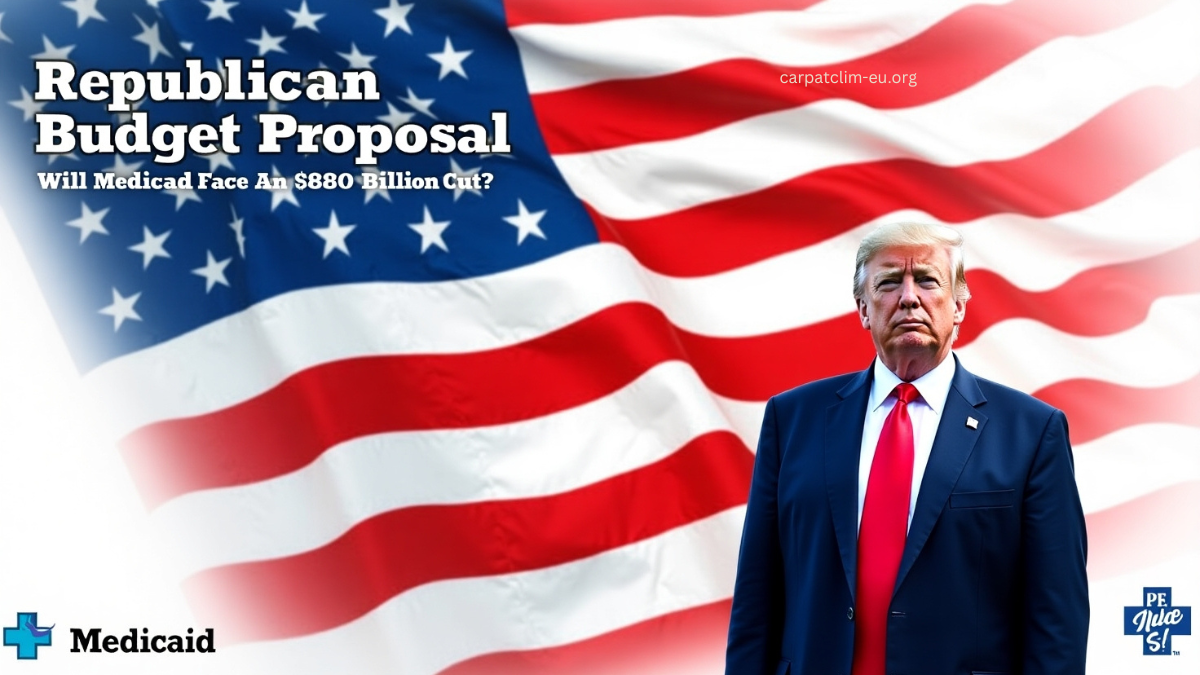Personal Finance
Republican Budget Proposal – Will Medicaid Face An $880 Billion Cut?

The new Republican budget proposal has sparked widespread concern, particularly among those who depend on government-funded healthcare programs like Medicaid.
With nearly 80 million Americans enrolled in Medicaid, potential funding reductions are raising alarms about the future of healthcare assistance for low-income individuals.
Is an $880 Billion Cut to Medicaid Inevitable?
A recent budget proposal from House Republicans suggests significant spending reductions, which many believe could directly impact Medicaid and Medicare.
According to an analysis from the Energy and Commerce Committee, achieving $880 billion in savings would be nearly impossible without making substantial cuts to one or both of these programs.
“There simply isn’t enough funding within their jurisdiction to meet that goal without touching Medicaid or Medicare,” explained budget expert Richard Kogan on social media.
While Republicans insist that Medicare will remain untouched, the implication is that Medicaid could face major funding reductions instead.
Former House Speaker Nancy Pelosi has also weighed in, criticizing the proposal and arguing that it places essential programs like Medicaid and SNAP at risk to benefit wealthy donors and corporations.
Does the Budget Resolution Clearly State Medicaid Cuts?
While concerns are growing, it is important to note that the budget resolution does not explicitly confirm an $880 billion reduction to Medicaid. The Energy and Commerce Committee oversees several other programs, including:
- Energy and climate initiatives
- The Federal Communications Commission (FCC)
- Food and drug safety regulations
Given this broad jurisdiction, there is a possibility that the largest spending cuts could be applied to areas outside healthcare. However, without clear details, uncertainty remains about the future of Medicaid funding.
Understanding Medicaid: Who Qualifies?
Medicaid is a vital program offering healthcare coverage to low-income individuals and families across the United States. However, eligibility criteria differ from state to state, making it essential for applicants to understand the specific requirements in their region.
Key Medicaid Eligibility Factors
- Income Level: Measured as a percentage of the Federal Poverty Level (FPL).
- Household Size: Larger families may qualify with slightly higher incomes.
- Citizenship Status: Only U.S. citizens and legal residents can apply.
- State-Specific Rules: Some states impose additional residency conditions.
- Categorical Eligibility: Priority groups include:
- Low-income children
- Pregnant women
- Certain parents or caregivers of minors
The table below highlights Medicaid income eligibility thresholds based on FPL percentages:
| Eligibility Group | Income Limit (% of FPL) |
|---|---|
| Children | Up to 138% |
| Pregnant Women | 133% – 205% (varies by state) |
| Parents/Caretakers | Up to 138% |
| Adults (without dependents) | Varies by state |
What Happens if Medicaid Faces Budget Cuts?
If significant funding reductions occur, the following consequences may arise:
- Stricter eligibility rules, making it harder for individuals to qualify.
- Reduced coverage for essential healthcare services.
- Longer waiting times for medical care and approvals.
- Fewer participating providers, as lower reimbursements could push doctors and hospitals away from Medicaid patients.
While Republicans insist that Medicare will remain untouched, the concern over Medicaid budget cuts remains high.
The proposed $880 billion savings goal raises questions about whether healthcare services will bear the brunt of the cuts or if other government programs will take the hit.
For millions of low-income Americans, any reduction in Medicaid funding could severely impact their access to essential healthcare. Until further details emerge, the future of Medicaid remains uncertain.
FAQs
Will Medicaid actually lose $880 billion in funding?
The budget resolution does not explicitly confirm this amount, but experts suggest it’s difficult to achieve such savings without Medicaid cuts.
Are Medicare benefits at risk?
Republicans have stated that Medicare will not be affected, but concerns remain about how savings will be achieved without touching it.
Who is most vulnerable to Medicaid cuts?
Low-income families, children, pregnant women, and seniors who rely on Medicaid for essential healthcare services.
-

 Social Security1 week ago
Social Security1 week agoWho Will Qualify The $2000 Social Security Payment, February 12?
-

 US Coins1 week ago
US Coins1 week agoRare 1943 Copper Lincoln Wheat Penny Worth $2.5 Million, Still In Circulation
-

 Personal Finance2 weeks ago
Personal Finance2 weeks ago1964 JFK Half-Dollar Coins Fetch Over $150,000 At Auction
-

 Social Security2 weeks ago
Social Security2 weeks ago2 Reasons Your Social Security Payments Could Be Reduced as an SSDI Beneficiary
-

 Social Security2 weeks ago
Social Security2 weeks agoWho is Eligible for the $484 SSI Benefit in February 2025? Payment Details Inside
-

 Latest News1 week ago
Latest News1 week agoSocial Security Payments Up To $5,108 Begin This Week – Check Your Eligibility Now!
-

 Personal Finance1 week ago
Personal Finance1 week agoGet Up To $8,000 In IRS Tax Credits – See If You Qualify & Learn How To Apply!
-

 Social Security2 weeks ago
Social Security2 weeks agoIndividuals at Risk of Losing Social Security Benefits in February












